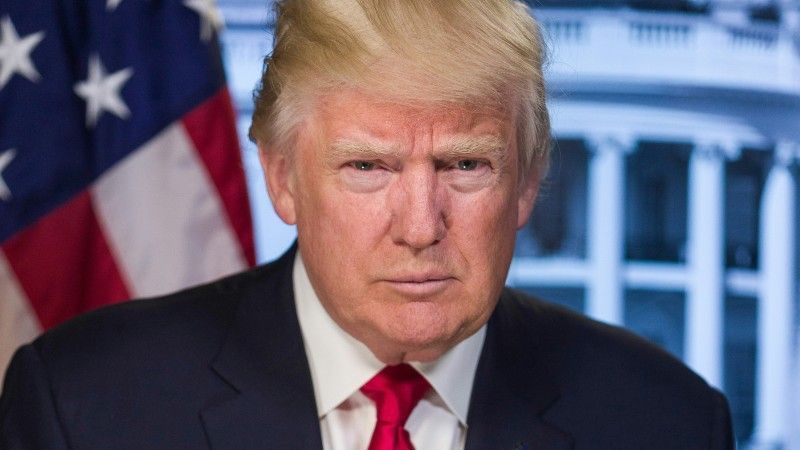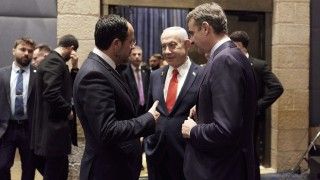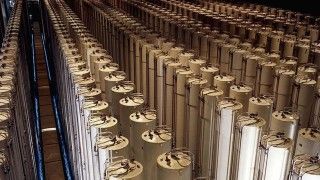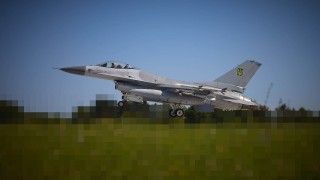- WIADOMOŚCI
Trump wins: what this means for Poland, NATO, and the world
Donald Trump has once again triumphed in the presidential election, raising numerous questions about the future of Poland, NATO, and international relations. With a strong mandate and control over Congress, the new Republican president is set to reshape U.S. foreign policy. Although his administration will initially focus on domestic issues, Poland—one of the key allies in Central and Eastern Europe—has a particular stake in the developments on Europe’s eastern front. Amid ongoing threats from Russia, China’s growing influence, and the expectations of the European Union, Trump’s new term promises to be pivotal.

Photo. Library of Congress/ Unsplash
It is now evident that the 47th president of the United States will be the Republican candidate Donald Trump. He has won both a strong popular mandate and, for at least the next two years (until the midterm congressional elections), will enjoy a comfortable governing position. The Republican Party has not only maintained its majority in the House of Representatives and has a supportive Supreme Court but has also secured a majority in the Senate. For American voters, domestic issues (such as the economy, illegal immigration, and abortion) traditionally remain the most significant campaign themes, but from the perspective of U.S. allies—including Poland—the future administration’s foreign policy agenda, along with trade policy, is of utmost importance.
Trump's priorities
At present, Trump’s administration, as in his previous term, will prioritize domestic policy. This does not mean that international policy will be neglected, but initially, the focus will undoubtedly be on America. The new president is far from an isolationist, having announced various changes, particularly in relation to the war in Ukraine.
The United States is a core member of organizations such as NATO and the UN, where changes are also anticipated, driven by American interests. Additionally, projects initiated during Trump’s first term, such as the Three Seas Initiative and the Bucharest Nine, will be significant. This is very positive news for Poland, which will host the Three Seas Summit in Warsaw during the last week of April next year.
In extending congratulations to the newly elected president, European leaders are motivated by a desire to maintain positive relations with the U.S. and by concerns about the future direction of American foreign policy. An example is the Lithuanian president’s emphasis on Vilnius’s commitment to spending 3.5% of GDP on defence under NATO, a level that is set to increase further. Poland, with its 4% GDP contribution, significantly surpasses countries like France, which allocates around 2%. World leaders are now positioning themselves in relation to the new U.S. president.
Trump’s forthcoming presidency, like his previous term, is expected to follow a pragmatic, transactional approach, with a focus on employing strategies that benefit America. Foreign policy, in his view, is just one aspect of a broader agenda to elevate the U.S., with the new head of state at the forefront. The shift in the White House does not signal revolutionary policy changes, as a global superpower like the United States is not likely to dramatically shift its stance every four years. Key allies are already established—Israel, Saudi Arabia, Australia, Japan, and Canada—and these alliances will certainly endure, though new partnerships may also emerge.
Foreign Policy of the Future Trump Administration
Declarations made during the election campaign should be approached with some caution. It is important to remember that, on the one hand, the language of communication with potential voters requires some simplifications, and on the other hand, presidential candidates from the opposition party cannot count on as broad support from officials and advisors who are well-versed in political nuances as incumbent leaders or administration members. An example is Trump’s first term, which, despite statements during the campaign that raised doubts—such as calling NATO outdated or indicating that aid to allies would not be automatic and would be contingent on their defence spending—was less controversial than negative scenarios predicted and relatively close to the traditional Republican line.
China Always as a Challenge
During his first presidency, Trump increased spending on the armed forces, reversing the cuts from the Obama administration, and emphasized competition with regimes perceived by the U.S. as potential threats. Besides Iran (including withdrawal from the P5+1 nuclear agreement with Iran), China became a primary target for Trump, who toughened trade policy (even initiating a trade war), restricted the flow of sensitive technologies, and strengthened regional cooperation, such as reviving the QUAD format (Australia, Japan, India, and the U.S.).
The U.S. focus on China and the Indo-Pacific was not new, as greater concentration on the region had been planned by the George W. Bush administration, and the „pivot to Asia” was announced by the Obama administration. The Biden administration has generally maintained and even increased the technological restrictions on China imposed by previous administrations. In Trump’s second term, a continued focus on the Indo-Pacific region (there is bipartisan consensus on this in Washington) and the challenges related to China’s growing power should be expected.
Trump will view allies and partners solely in terms of how they can benefit the United States, not necessarily vice versa, and therefore will be less inclined to go to war with China, whether over Taiwan or any other U.S. ally. However, the new administration must take into account that China will test limits and may increase its presence in the South China Sea and the Taiwan Strait. Thus, a Trump presidency would likely be more selective in maintaining U.S. commitments and more cautious in using military force abroad.
Trump’s presidency will be marked by strong personal relationships with Prime Minister Narendra Modi, combined with a transactional foreign policy. U.S.-India relations will prioritize trade due to the announced tariffs. Illegal immigration will be a sticking point, as there were 97,000 undocumented Indian immigrants in the U.S. in 2023. Trump also knows that if he wants to compete with China, his first partner will be India.
Australia’s main priority will be to demonstrate the crucial importance and role that U.S.-Australian relations play in both foreign policy and national security for Australia, including emphasizing Australia’s defence and infrastructure spending. Convincing arguments—perhaps in more transactional terms—will be presented to the Trump administration to continue actions under AUKUS.
After Trump’s victory, North Korea will (initially) feel emboldened and increase the number of missiles launched toward South Korea, while Japan and South Korea will try to keep the U.S. engaged in the region. Trump does not place much emphasis on climate change, which may make small island nations in Oceania feel threatened by escalating environmental crises.
The Middle (close) East and Africa
On the Middle East, Trump in his first term also adhered to the traditional Republican line by providing strong support for Israel. His administration recognized Jerusalem as the capital of the Jewish State and facilitated its recognition by several regional states (the Abraham Accords). Trump also did not hesitate to use force, as in the case of the attack on Syria after the Assad regime used chemical weapons. Here too, one can expect a continuation of the policy from the first administration, with a strongly anti-Iran and pro-Israel agenda.
The Trump administration will support the Israeli government in the conflict with Hamas more decisively than the Biden team, favouring a vision of ending the war on Israeli terms. Social pressure for a ceasefire will intensify after the presidential elections. Meanwhile, policy toward Iran will continue with „maximum pressure” to force Iran to limit its nuclear weapons program. The U.S. will continue to impose sanctions on Iran and demonstrate its readiness to use force.
Recep Tayyip Erdogan was very hopeful for Trump’s victory. Turkish decision-makers estimated that a Kamala Harris win would mean the marginalization of Turkey. Although Ankara and Washington will have divergent interests in Syria and the Israeli-Palestinian conflict, the United States will look favourably on Turkey’s mediation efforts in the context of the Ukraine-Russia war.
Neither President Biden nor Trump paid much attention to the African continent. It will certainly not be one of the priorities of the new U.S. administration. During his campaign, he did not mention Africa even once. Only after a few months will the new president decide on the deployment of American troops and engagement in cooperation with African countries, which is crucial for resource extraction. In addition, competition with China (and partly with Russia) will also take place on the African continent.
Ah, Europe
The announcement of tariffs on all U.S. allies was very poorly received, suggesting the start of a trade war between the U.S. and the EU. The German automotive industry would be the first affected, facing tariffs on car imports from the EU. In turn, the EU would impose retaliatory tariffs on American products, as it did during Trump’s first term. The new U.S. president will use his influence in some EU countries (e.g., Hungary) to block a strong EU response.
London’s approach will be interesting, as the United Kingdom will face a huge dilemma. A long-standing goal of the U.K.’s policy towards the U.S. is to maintain a special—close relationship. On the other hand, Donald Trump remains an unpopular politician in the U.K., especially among Labour supporters. This relationship will also be of great importance for NATO.
Although the Macron-Trump relationship never seemed good, the French president further inflamed the situation the day after the election results by saying that „Europe cannot count on America, it must count on itself.” However, for France, the new administration in America does not necessarily mean a bad scenario. Both presidents cooperated during Trump’s previous presidency and understand each other well because they come from financial-business backgrounds. Macron still has three years left in his term and will likely want to show that he is independent of Trump. The French Foreign Minister Jean-Noel Barrot is more conciliatory, emphasizing that France will work with the U.S. regardless of the election results.
Vladimir Putin
Vladimir Putin officially congratulated Donald Trump, recognizing him as the legitimately elected U.S. president and stressed that he sees no obstacles to establishing direct contact, although he is currently skeptical about phone conversations. However, he assured that Russia is ready for broad talks with the U.S., expressing hope for more stable relations based on mutual respect and balance of interests. Putin made it clear that the further development of relations would depend on Washington’s actions, suggesting the need for a concrete response and willingness to cooperate from the American administration.
Trump wants to position himself as an undisputed authority on the international stage, holding sway over politicians like Zelensky, Putin, and Kim Jong Un. In Europe, the United States will want to find a regional leader to act as a sort of regional enforcer. Poland or Romania could potentially fill that role.
Reactions to Donald Trump’s Victory
Israeli Prime Minister Benjamin Netanyahu and Hungarian Prime Minister Viktor Orbán warmly congratulated Donald Trump, suggesting that the relationships between the USA, Israel, and Hungary will remain close over the next four years. British Prime Minister Keir Starmer referred to the historic British-American alliance, emphasizing the need to strengthen bilateral relations. Indian Prime Minister Narendra Modi called Trump a „friend” and expressed hope for further strengthening cooperation for peace and prosperity.
Emmanuel Macron extended diplomatic congratulations, signaling France’s readiness to cooperate despite differences, before having a conversation with German Chancellor Olaf Scholz. The two leaders agreed on actions for a more unified, strong, and sovereign Europe, working with the USA while defending its own interests. Ursula von der Leyen, the President of the European Commission, called for the building of a strong transatlantic agenda, emphasizing that the ties between the USA and the EU go beyond a formal alliance.
Polish representatives also congratulated Trump, including President Andrzej Duda, Prime Minister Donald Tusk, Defense Minister Kosiniak-Kamysz, NATO Secretary General Mark Rutte, Ukrainian President Volodymyr Zelensky, Austrian Chancellor Karl Nehammer, Slovak President Peter Pellegrini, Lithuanian President Gitanas Nausėda, Estonian President Alar Karis, Spanish Prime Minister Pedro Sanchez, Italian Prime Minister Giorgia Meloni, Finnish President Alexander Stubb, and Serbian President Aleksandar Vučić. All expressed hope for continued cooperation with the USA in the spirit of mutual benefit, peace, and stability.
Turkish President Recep Tayyip Erdogan expressed hope that Trump would make efforts toward peace in Ukraine. Dmitry Medvedev commented with satisfaction on Kamala Harris« defeat, confirming that Russia’s plans for its „special operation” remain unchanged. China’s Ministry of Foreign Affairs, through its spokesperson, stated that Beijing approaches its relations with the USA on the basis of mutual respect, peaceful coexistence, and benefits for both sides. Russian Foreign Ministry spokeswoman Maria Zakharova responded to Trump’s declarations about ending conflicts, stressing the need for concrete actions in that direction.
African leaders expressed their readiness to cooperate with Donald Trump following his victory in the elections. President Felix Tshisekedi of the DRC, Umaro Sissoco Embalo of Guinea-Bissau, Bola Tinubu of Nigeria, and Bassirou Diomaye Faye of Senegal highlighted the desire to strengthen economic relations and actions for peace. Emmerson Mnangagwa of Zimbabwe promised collaboration for a wealthier world, while Cyril Ramaphosa of South Africa expects a mutually beneficial partnership. Ethiopian Prime Minister Abiy Ahmed and Paul Kagame of Rwanda expressed readiness for joint actions for both countries. William Ruto of Kenya praised Trump’s „visionary leadership,” while Wavel Ramkalawan of Seychelles expressed concerns about the USA’s involvement in climate issues.
Effects on NATO and the Eastern Flank
From Poland’s perspective, the most critical issue will be the U.S. policy under Trump regarding NATO, the eastern flank of the Alliance, and Ukraine, which is at war with Russia. During Trump’s first term, tensions arose with some European NATO allies (Trump even threatened to leave the Alliance in a second term). In the recent election campaign, he did not hesitate to make controversial statements, suggesting that he would even encourage Russia to adopt an aggressive stance towards allies who fail to meet their commitments.
Despite the divisive rhetoric, Trump’s proposals are not new; successive U.S. administrations, starting with George W. Bush, have pressured European allies to increase defense spending and contribute more to collective defense. Paradoxically, it seems that Trump’s tough stance, especially following Russia’s aggression against Ukraine, has been somewhat effective. While only five NATO members met the defense spending target of 2% of GDP (agreed upon at the 2014 Newport summit) in 2016, today 23 countries meet this requirement. In other aspects of European security, Trump’s first term largely continued the previous administration’s policies, even strengthening the U.S. presence on key fronts, including the eastern flank.
The greatest concern is likely the new administration’s approach to the war in Ukraine. Both Trump and his prospective vice president, J.D. Vance, were highly critical of continued U.S. military aid to Kyiv. Moreover, they promised to take immediate steps to end the war, which at this stage would likely involve accepting many of Russia’s conditions (the Kremlin demands recognition of the „territorial reality” in Ukraine).
Such a scenario would be extremely difficult for the authorities in Kyiv to accept and could be politically catastrophic for them. However, it is important to note that the current administration will still be in power for a few more months and will likely take further steps to strengthen Ukraine before the next year. A comparable portion of assistance to the U.S. aid is already coming from the EU. The time gained should be used effectively to convince the new administration that continuing the effort to secure Ukraine’s victory is worthwhile. A crucial argument here will be the growing cooperation between authoritarian regimes, including the Russia-China partnership.
From Poland’s perspective, there should be no expectation of a collapse in relations with the United States after the new administration takes office. Trump has repeatedly spoken positively about Poland, even citing it as a good example of a loyal ally.
For Warsaw, the most negative scenario would be the suspension of U.S. aid to Ukraine or an increase in tensions in transatlantic relations between the European Union and the United States (for instance, over trade issues or relations with China). Therefore, Poland should seek to leverage potentially good relations with Trump’s administration to maintain transatlantic unity.
Authors:
Dr. Aleksander Olech, Head of International Cooperation at Defence24, Lecturer at the Baltic Defence College
Dr. Tomasz Smura, Board Member, Director of the International Security and Defense Program, Kazimierz Pułaski Foundation















